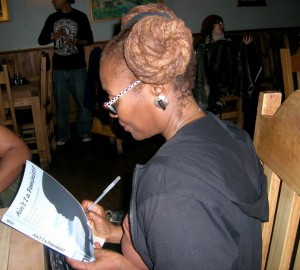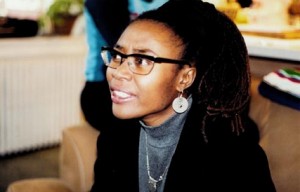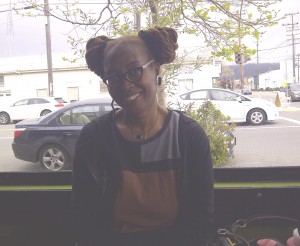Remembering and Celebrating the Life and Legacy of Aaronette M. White
It is with deep sadness and profound devastation that I share that radical Black/Pan-African feminist activist and social psychologist Aaronette M. White, Ph.D., recently made her physical transition. While there is presently uncertainty about the exact date and time of her sudden death, no foul play or harm was done to her in the last hours of her life. Her body was found in her apartment on Tuesday, August 14, 2012. The belief is that she suffered an aneurysm. She was 51-years old.
Aaronette was one of my dear and close friends who was also a trusted confidante. I first met her in September 1996 at the Black, Male & Feminist/Womanist conference, which was organized by Black Men for the Eradication of Sexism, a student group at Morehouse College. At that point, I was barely in year two of the twelve-year journey to make my feature-length film NO! The Rape Documentary. Thanks to radical, trailblazing Black feminist scholar-activist, and Big Sister-friend Beverly Guy-Sheftall, Ph.D., who is the founding director of Spelman College’s Women’s Research and Resource Center and their Anna Julia Cooper Professor of Women’s Studies, I was invited to be a presenter at the conference. In remembering that historic gathering, Beverly wrote,
[…]Though not many of us were at Morehouse in 1996 (bell hooks was also there as the keynote speaker), it was a critical moment in the development of a young cohort of brothers who claimed unapologetically their allegiance to [B]lack feminists and FEMINISM!!!!
It was a powerful moment in which some friendships, camaraderies, and allegiances were formed and are still going strong today.
When Aaronette heard that I was making a film about intra-racial rape, other forms of sexual violence, and healing in the Black community, she immediately came up to me at the conference to ask how could she be involved with this project. Shortly after my return home, she sent me a package, which included a donation towards the making of NO!, her curriculum vitae, extensive resources directly related to her ground breaking research and scholarship on anti-rape activism in the Black community. The package also included a letter offering to be involved, for free, in any way possible. This past June, we laughed hysterically during one of our many Sister-friend marathon phone conversations remembering her first mailing to me. Little did she know at the time of sending me her very extensive package in 1996, I was desperate for any and all assistance and expertise in support of the making of NO!. Aaronette literally thought she had to convince me that she would be a wonderful resource for the project. Shortly after receipt of her first of many packages over the years, she became one of the five Black feminist scholar-activist advisors[1] to NO!. Equally as important, Aaronette, was a featured interviewee who shared both her testimony as a survivor of rape; and her scholar-activism on sexual violence on camera. Without expecting anything in return, Aaronette worked tirelessly in support of NO! always looking for ways for me to secure funds to help me cross the finish line; and to spread the word about the making of the documentary. She most generously gave her time both as a scholar-activist and also as one of the consistent trusted shoulders upon which I leaned for ten out of the twelve years it took for me to make NO!.
Aaronette’s activism, scholarship, and writings were frequently ahead of the curve. She constantly championed unsung warrior feminist women who were predominantly of African descent. However, she celebrated the resiliency and (sometimes armed) resistance of all women she defined as freedom fighters.
At the time of her untimely death, Aaronette was working on at least two book projects. One co-edited project with her dear friend and pro-feminist scholar-activist Gary L. Lemons, Ph.D., which is tentatively titled Black Feminist and Womanist Pedagogies: When the Personal is Political and Academic. Based upon my understanding from Aaronette, this book project is an edited collection of previously published and original essays by Black feminist and womanist scholar-activists on their experiences and lessons learned from teaching radical pedagogies in what I personally call the Academic Industrial Complex. I was thrilled when she asked me to write an essay about my experiences teaching an undergraduate course on Diasporic African women filmmakers when I was an Artist-in-Residence at the University of Chicago‘s Center for the Study of Race, Politics, and Culture.
The other project, which I believe was presently untitled at the time of her death, was envisioned to be an in-depth comparative study, based upon her first-person interviews with African women war veterans who fought in Ethiopia’s 17-year civil war; in South Africa’s armed wing of the anti-Apartheid struggle; and in the Rwandan army to end the 1994 genocide. Aaronette was concerned that we very rarely, if ever, heard from the voices of African women freedom fighters. Often, while fighting in their countries, many (but definitely not all) of these women warriors were raped by their own male comrades with whom they were fighting. She was also interested in exploring what happened to these African women war veterans after the wars ended. She wanted to know how they were received and treated in their countries. In a Pan-African context, she wanted to lift up their testimonies to add her voice, research, and writings to the growing chorus of diasporic African feminists who challenge the sexist notion that revolution is something that only men wage.

Aaronette signing Cornelius Moore’s copy of her book “Ain’t I A Feminist: African American Men Speak Out on Fatherhood, Friendship, Forgiveness, and Freedom”
photo credit: Aishah Shahidah Simmons
Aaronette’s first book, Ain’t I A Feminist? African American Men Speak Out on Fatherhood, Friendship, Forgiveness, and Freedom (S.U.N.Y. Press, 2008) examined the experiences of African-American men who self identify as feminists. Aaronette’s process with identifying each of the (anonymously) featured men required a personal recommendation from a Black (woman) feminist. Her belief was that it was not enough for a man to believe he was a feminist, she needed to also hear from at least one, but preferably more than one Black feminist to confirm that this was the case. Her second book African Americans Doing Feminism: Putting Theory into Everyday Practice (S.U.N.Y. Press, 2010), is an edited collection of personal stories and testimonials about how feminism has influenced the lives of feminist African-American women and men.
Aaronette lived her life out loud and without apology for her bold, take no prisoners radical feminism. She didn’t suffer fools wisely. The few times we were able to present NO! The Rape Documentary together, she was adamant that the first three questions or comments, immediately post the screening of the film, were from survivors of child sexual abuse and/or sexual violence. She wanted to make sure the voices of survivors were centralized and heard first and foremost. If she thought a person (man or woman) was trying to condone rape especially in the name of playing “devil’s advocate,” she would shut the conversation down immediately. She always did everything that she could to ensure that survivors felt safe and supported, most especially at NO! events where she was present.
A true global citizen, Aaronette became an integral part of the communities she lived in the several countries she called home.
The last time I saw her was in March 2012 when I was in Berkeley, California for a two-day symposium on Gendered Violence Against African American Girls and Young Women, which was hosted by the Thelton E. Henderson Center for Social Justice at University of California, Berkeley School of Law. At the end of the symposium, Aaronette drove up from Santa Cruz and we spent most of one day together. While we were frequently in touch through our marathon phone conversations, we hadn’t seen each other since April 2008. It was a Sister-friend reunion of the highest order. We ate lots of good, organic vegetarian food. And, we laughed so much until we cried tears of joy about being together in person. I will always cherish that time. Recognizing that NO! is a documentary, which very unfortunately is still relevant, we envisioned an opportunity where we might be able to bring all of the survivors, scholars, activists, and/or cultural workers featured in NO!, and the key production and post-production personnel who made NO! for both a screening and public dialogue about all of the issues raised in the film and how it relates to where we are today as a non-monolithic community. Aaronette and I weren’t sure if it should be a one-day or two-day event. We talked about ideas for the location and potential funders who might be interested in supporting this vision.
This summer Aaronette received an endowed chair at University of California, Santa Cruz where she was on the faculty in the psychology department. We were rejoicing because while she was always fortunate to receive some of the most prestigious fellowships for her unapologetically radical work, this was the first time where she felt like would be able to exhale completely. She was in the process of purchasing a condo on (or near the ocean) in Santa Cruz. In fact, she was going to close within the next week or two. And, true to form, Aaronette was strategizing how to support her Sister-friends whose work she believed in and supported. When I casually shared with her that I was scheduled to present at the National Women’s Studies Association (NWSA) annual meeting this November but shared that I had no idea how I would be able finance the trip, she immediately said,
Oh, that’s simple. I’ll bring you out to screen and discuss NO! at U.C. Santa Cruz. You’ll receive your full honorarium; and then we’ll go to NWSA together. Problem solved, Gurl, PROBLEM SOLVED! These are the things I can do now that I have an endowed chair. What better way to use these funds than to talk and educate about Black women and rape.
I first received word about Aaronette’s death on August 15, 2012 from scholar-activist and friend Tamara K. Nopper, Ph.D. Tamara assumed I knew and sent me an email to offer her deeply felt condolences and to thank me for helping to “get [Aaronette’s] story and analysis out there (through NO!).” When I read Tamara’s email, I was in a remote part of Marshall, CA attending a Ms. Foundation for Women sponsored and hosted gathering for invited predominantly women of color and gender queer of color activist-leaders who work on ending child sexual abuse. My cell signal was practically non-existent and internet was not readily accessible at the venue where the gathering was held. I thought there had to be a major mistake. I talked to Aaronette at the end of June, right before I departed for my 35-days off of the grid journey to deepen my 10-year practice of vipassana meditation as taught by S.N. Goenka. We were going to talk when I returned in August. I was going to see her in her new home in November. She wasn’t sick. I had to immediately find a computer with consistent access to the internet. I had to google her name to prove that Tamara made a major mistake. There must’ve been another Aaronette White who transitioned. Much to my horror, Tamara was right. I saw the article, with her photograph, posted on U.C. Santa Cruz’s site.
I am grateful that I was at the Ms. gathering of activist-leaders who work on ending child sexual abuse when I received the (still) shocking news in the form of a heartfelt email from Tamara. While some of the people “knew” Aaronette through her powerful presence in NO!, no one in attendance at the gathering knew her personally. In spite of this we held her name, her life, and her transformative Black feminist legacy up. It was a powerful sacred circle of radical women and transpeople who “spoke her name” and celebrated her contributions to making this world a more just, compassionate, and humane place for all its inhabitants during her lifetime.
While still in California, my friend Cornelius Moore, who’s the co-director of California Newsreel (co-distributor of NO!, with AfroLez® Productions), and I spoke Aaronette White’s name over dinner, through some of the night, and in the morning on my way to the airport home to Philadelphia. He, along with one of her four sisters and best friends Lisa Diane White, who’s the director of programs for SisterLove, Inc., were some of the last people I personally know who spent extended time with Aaronette in July. It was heartwarming to be able to hear poignant and funny stories from both Lisa and Cornelius about Aaronette during what became the last month of her life. The wound from this tremendous loss is very deep and still festering for all of us who knew and loved her. I’m grateful for the community sharing in person, on the phone, and in cyberspace in my first 24-hours of living knowing that I will never see, talk to, cry with, laugh with, celebrate with, and confidentially share with Aaronette Michelle White.
In an August 16, 2012 Facebook post remembering Aaronette, my sister-survivor, dear friend, and poet extraordinaire Honorée Fanonne Jeffers who is one of the three featured poets[2] in NO! wrote,
Aaronette and I were young women, only in our thirties, when we met during a magical weekend in Philadelphia. We had been calledd–“called” is the only word I can think of-by Aishah Shahidah Simmons to appear in the film NO! The Rape Documentary. We had been called to tell our stories as Black women rape survivors. We had been called to break our silence and dispel our shame. We had been called to love each other and accept each other, not to roll our eyes and pick apart each other’s appearances and take out our pain on each other.
I always remember the night Aaronette and I spent talking, her warmth and the way she pulled in others with that warmth. I remember thinking, “THIS woman is a rape survivor?! How can this be? She is so happy and so stylish and so full of good self-awareness.” Meeting Aaronette and spending that weekend with her, Aishah, Salamishah Tillet and others was the beginning of my finding and loving myself…
That weekend was a healing, the beginning of my lifelong journey to embrace self-acceptance, self-love, love for others, and spirituality. I can say with all that is in me that if it hadn’t been for that weekend, I would not be the poet and the woman I am today, and I would not have the happiness and peace I have found within. Aaronette and Aishah were the first Black women of my age (that I didn’t grow up with) who gave me unconditional acceptance. Who made me feel safe, even in the middle of the horrific experience of sharing my story as a rape survivor on film, breaking my silence, and putting aside shame and trauma in order to help other women. In order to help myself…
Echoing Honorée, Beverly [Guy-Sheftall] also captured the sentiments of many who knew Aaronette when she wrote,
[…]Though I didn’t see [Aaronette] enough, she was always on my mind when I thought about the [B]lack feminist community that all of us were able to craft over the years–her smile, her spirit, her wisdom, her productivity, and so much more…
I rejoice knowing that Aaronette’s legacy will live on through all of the lives she personally touched; her radical Black feminist activism, which centralized margins; and her published writings. I am eternally grateful for her powerful presence in NO! and in Breaking Silences. I am also holding on to the vision that one day in the not too distant future, my and Aaronette’s vision of all of the NO! interviewees, performers, and production crew coming together for private sharing, public screening and dialogues. It will womanifest in Aaronette’s name.
VIVA the life, legacy, fierce, and unapologetic RADICAL BLACK FEMINIST SPIRIT of daughter, sister, friend, comrade, activist, scholar, and teacher Aaronette Michelle White. I will honor her legacy as long as there is conscious breath in my body.
[1] The other four scholar-activists advisors to NO! are Janelle L. White, Ph.D., Charlotte Pierce-Baker, Ph.D., Elsa Barkley Brown, Ph.D., and Kimberly D. Coleman, Ph.D.
[2] The other two featured poets in NO! are the late Essex Hemphill and Samiya A. Bashir.






60 Comments